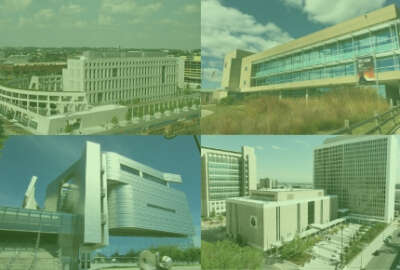

The Green Building Advisory Committee drafted a recommendation letter to the General Services Administration Renewable for piloting renewable energy outleasing on...
Some observers from the worlds of sustainability and building design think federal rooftops could be excellent candidates for solar energy.
The Green Building Advisory Committee drafted a recommendation letter to the General Services Administration for piloting renewable energy outleasing on federal properties.
Outleasing is the practice of renting vacant or unused space on agency buildings, such as rooftops and parking lots, to utility companies which then install their equipment. According to the committee, GSA uses outleasing for renting roof space for antenna placement by telecommunications companies. And members suggested more could be done in a public-private partnership model.
“So in this case, we basically said the federal government has lots of building roofs, lots of vacant spaces such as parking lots, etc. But it does not have a lot of capital dollars,” Projjal Dutta, the committee chair and director of sustainability initiative for the New York State Metropolitan Transportation Authority, said during an online committee meeting on June 11. “So can we create a synergy out of these two situations and ask the private sector to bring their capital dollars to bring their own — and use our underutilized assets to generate renewable power?”
Dutta said the capital costs for solar power have decreased by as much as 70%, meaning it does not require traditional subsidies.
“It can stand on its own two feet. It can generate a profit, and some of that could become a rent to the landlord — in this case the federal government,” he said.
By applying Section 111 of the National Historic Preservation Act, the committee said, some rooftop space on several historic GSA properties could be outleased for photovoltaics (PVs), or solar cells. Proceeds would be deposited in the historic property outlease budget activity account in the Federal Buildings Fund to defray GSA’s costs.
GSA would not be responsible for solar panel operations and maintenance under renewable energy outleasing, according to the draft recommendation letter.
Chris Castro, co-chair of the committee’s task group which developed the recommendations, listed three candidates to pilot historic building outleasing: the U.S. District Courthouse for the Western District of North Carolina in Asheville, the U.S. District Courthouse for the Middle District of Pennsylvania in Scranton, and the Milwaukee Federal Building and U.S. Courthouse in Wisconsin.
He said these three historic sites have newer roofs and are located in downtown areas with lower energy paucity — making them ideal candidates.
“We’re looking for agencies, applying this model to agencies that have long term authority that can be utilized; a site that can receive payment or in kind consideration,” said Castro, who is the director of sustainability and resilience for the city of Orlando, Florida. “The other thing we talked about is that there’s an energy offtaker available. And obviously there is a complex web of regulatory structures across the country.”
Castro said the group identified markets with feed-in tariffs or renewable portfolio standards, and which have a utility interested in procuring renewable electricity. He added that solar renewable energy credits and other incentives could make the business case for this form of outsourcing.
“And of course, like all projects, you need somebody internally to be this project champion to aggressively push it forward,” he said.
The GBAC is charged with offering “independent policy advice and recommendations to GSA’s Office of Federal High-Performance Buildings (OFHPB),” to promote building innovation, reduce operating costs and further environmental sustainability, according to the agency’s website. Ken Sandler, designated federal officer for the OGHPB, said that as an advisory committee established under the Federal Advisory Committee Act, the group’s findings were from external advisers and not part of GSA internal decision-making.
The committee agreed to take a week to give members time to review the letter to GSA and vote electronically whether to send it forward.
Copyright © 2025 Federal News Network. All rights reserved. This website is not intended for users located within the European Economic Area.
Amelia Brust is a digital editor at Federal News Network.
Follow @abrustWFED



